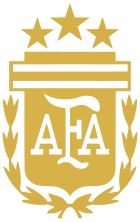The Argentina national football team (Spanish: Selección de fútbol de Argentina), nicknamed La Albiceleste ('The White and Sky Blue'), represents Argentina in men's international football and is administered by the Argentine Football Association, the governing body for football in Argentina.
They are the reigning world champions, having won the most recent World Cup in 2022, earning their third star shown by the team's crest. Overall, Argentina has appeared in a World Cup final six times, a record equaled by Italy and surpassed only by Brazil and Germany. Argentina played in the first ever final in 1930, which they lost 4–2 to Uruguay. The following final appearance came 48 years later, in 1978, when the team captained by Daniel Passarella defeated the Netherlands 3–1 in extra time, becoming world champions for the first time. Captained by Diego Maradona, Argentina won their second World Cup eight years later, in 1986, with a 3–2 final victory over West Germany. They reached the final once more under the guidance of Maradona, in 1990, but were ultimately beaten 1–0 by West Germany. A few decades later, Argentina, led by Lionel Messi made their fifth final appearance in 2014, losing to Germany 1–0 after extra time. In 2022, again captained by Messi, they were crowned world champions for the third time, the fourth-most of any country, beating France 4–2 on penalties, following a 3–3 draw after extra time. The team's World Cup–winning managers are César Luis Menotti in 1978, Carlos Bilardo in 1986 and Lionel Scaloni in 2022. In addition, Argentina has also been very successful in the Copa América, with a record 16 titles, most recently winning the 2024 edition. They are also the only nation to have won the Copa América three consecutive times: they did it in 1945, 1946 and 1947. Furthermore, Argentina won the inaugural FIFA Confederations Cup in 1992 and is the most successful team in the CONMEBOL–UEFA Cup of Champions, having won it twice, in 1993 and 2022. The national team also won the Panamerican Championship in 1960. In total, with 23 official titles won as of 2024, Argentina holds the record in senior official titles won.[11][12][13]
Argentines Guillermo Stábile in 1930 and Mario Kempes in 1978 were the top-scoring players at their respective World Cups. Since the Golden Ball for the tournament's best player was officially awarded by FIFA in 1982, Argentina players have won it three times: Maradona in 1986 and Messi in 2014 and 2022. Individually for Argentina, Lionel Messi is the all-time most-capped player with 189 matches and the highest goalscorer with 112 goals. As of October 2024[update], Argentina ranks 1st in the FIFA Men's World Ranking.[14]
Argentina is known for having rivalries with Brazil, England, Germany, the Netherlands, Uruguay and France.[15][16][17][18][19][20][21][22][23][excessive citations]
- ^ Grove, Daryl (19 June 2010). "An explanation: 2010 World Cup team nicknames". Dirty Tackle. Archived from the original on 1 March 2022. Retrieved 1 March 2022.
- ^ "The FIFA/Coca-Cola Men's World Ranking". FIFA. 24 October 2024. Retrieved 24 October 2024.
- ^ Pelayes, Héctor Darío (24 September 2010). "Argentina-Uruguay Matches 1902–2009". Rec.Sport.Soccer Statistics Foundation. Archived from the original on 5 January 2019. Retrieved 7 November 2010.
- ^ Cite error: The named reference
iffhswas invoked but never defined (see the help page). - ^ Cite error: The named reference
nostalgiawas invoked but never defined (see the help page). - ^ Cite error: The named reference
barnadewas invoked but never defined (see the help page). - ^ "Historial entre Argentina y Bolivia". Sitio Oficial de la Asociación del Fútbol Argentino (in Spanish). Archived from the original on 2 February 2022. Retrieved 2 February 2022.
- ^ "Spain 6–1 Argentina: Isco scores hat-trick as hosts dismantle Argentina". Sky Sports. Archived from the original on 2 February 2022. Retrieved 2 February 2022.
- ^ "Official FIFA World Cup Origin document" (PDF). fifa.com (archive). Archived from the original (PDF) on 5 April 2014.
- ^ Elo rankings change compared to one year ago. "World Football Elo Ratings". eloratings.net. 14 November 2024. Retrieved 14 November 2024.
- ^ "Tras la conquista de Argentina en la Copa América, así quedó la tabla histórica de títulos de las selecciones del mundo". infobae (in European Spanish). 14 July 2024. Retrieved 12 August 2024.
- ^ Ritchie, Calum (1 June 2024). "The 10 most successful nations in football history ranked by major trophies won". GiveMeSport. Retrieved 12 August 2024.
- ^ "Top five nations with most major international football trophies". Khel Now. Retrieved 12 August 2024.
- ^ "Men's World Ranking". FIFA. Archived from the original on 27 April 2024. Retrieved 28 April 2024.
- ^ Tilghan, John (27 August 2009). "Argentina-Brazil: South America's Biggest Rivalry". Bleacherreport. Archived from the original on 28 August 2009. Retrieved 22 December 2021.
- ^ Duke, Greg. "Top 10 international rivalries". CNN. Retrieved 21 August 2018.
- ^ "Great Footballing Rivalries: Argentina vs. Uruguay " SportsKeeda". Sportskeeda. 4 July 2011. Archived from the original on 1 January 2014. Retrieved 7 June 2012.
- ^ Wetzel, Dan (1 July 2010). "War of words renews Argentina-Germany rivalry". Yahoo! Sport. Archived from the original on 9 July 2010. Retrieved 7 June 2012.Le Clash: Bitter soccer rivals France and Argentina meet in Olympic quarterfinals amid a racism spat Associated Press. 1 August 2024. Retrieved 3 August 2024.
- ^ "Argentina-Francia, una historia de rivalidades y partidos para siempre". 30 July 2024. Retrieved 4 August 2024.
- ^ https://www.ole.com.ar/juegos-olimpicos/morbo-francia-revancha-nuevo-clasico_0_008rBdZylq.html Morbo Francia: revancha no, nuevo clásico sí. Diario Olé, 1 August 2024.
- ^ https://www.tiempoar.com.ar/ta_article/y-ahora-argentina-francia-un-clasico-rival-moderno-de-alto-voltaje/ Y ahora, Argentina-Francia, un clásico moderno, de alto voltaje. Tiempo Argentino, 30 July 2024.
- ^ Bueno Álvarez, Juan Antonio; Ángel Mateo, Miguel (2014). Los mundiales de fútbol: De la celeste Uruguay a la roja España. Madrid: Edaf. ISBN 9788441434110.
- ^ "Inglaterra-Argentina: el origen de la rivalidad". FIFA. 17 October 2012. Retrieved 4 December 2019.
Cite error: There are <ref group=note> tags on this page, but the references will not show without a {{reflist|group=note}} template (see the help page).
